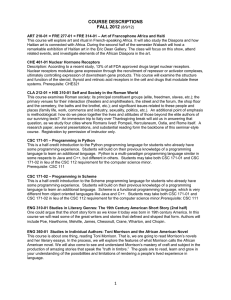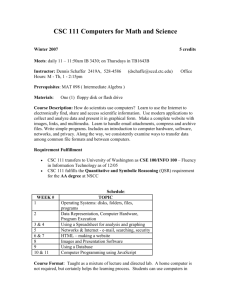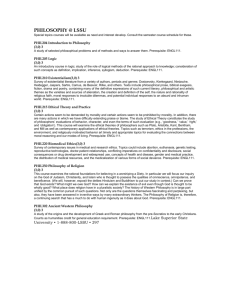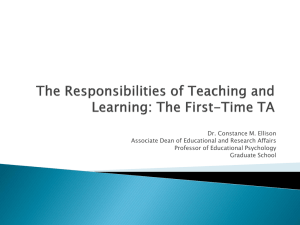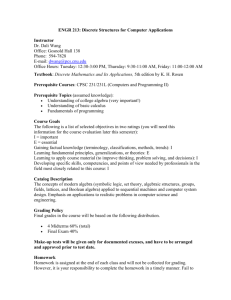HIS 340-02 History of Rap Music & Hip Hop Culture
advertisement
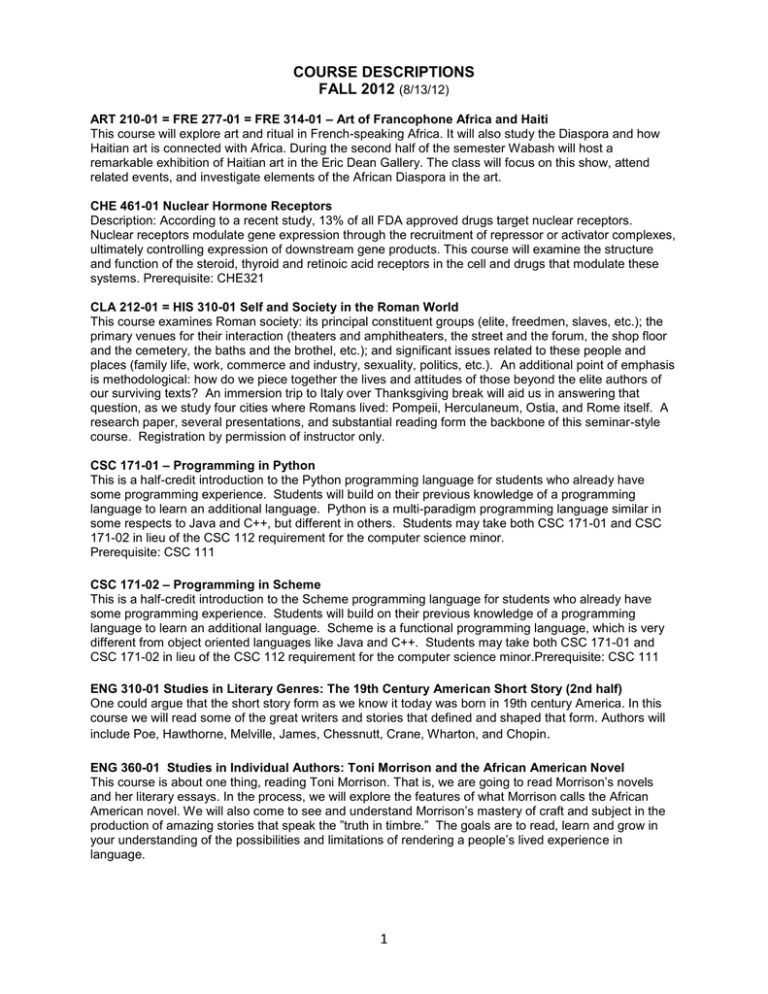
COURSE DESCRIPTIONS FALL 2012 (8/13/12) ART 210-01 = FRE 277-01 = FRE 314-01 – Art of Francophone Africa and Haiti This course will explore art and ritual in French-speaking Africa. It will also study the Diaspora and how Haitian art is connected with Africa. During the second half of the semester Wabash will host a remarkable exhibition of Haitian art in the Eric Dean Gallery. The class will focus on this show, attend related events, and investigate elements of the African Diaspora in the art. CHE 461-01 Nuclear Hormone Receptors Description: According to a recent study, 13% of all FDA approved drugs target nuclear receptors. Nuclear receptors modulate gene expression through the recruitment of repressor or activator complexes, ultimately controlling expression of downstream gene products. This course will examine the structure and function of the steroid, thyroid and retinoic acid receptors in the cell and drugs that modulate these systems. Prerequisite: CHE321 CLA 212-01 = HIS 310-01 Self and Society in the Roman World This course examines Roman society: its principal constituent groups (elite, freedmen, slaves, etc.); the primary venues for their interaction (theaters and amphitheaters, the street and the forum, the shop floor and the cemetery, the baths and the brothel, etc.); and significant issues related to these people and places (family life, work, commerce and industry, sexuality, politics, etc.). An additional point of emphasis is methodological: how do we piece together the lives and attitudes of those beyond the elite authors of our surviving texts? An immersion trip to Italy over Thanksgiving break will aid us in answering that question, as we study four cities where Romans lived: Pompeii, Herculaneum, Ostia, and Rome itself. A research paper, several presentations, and substantial reading form the backbone of this seminar-style course. Registration by permission of instructor only. CSC 171-01 – Programming in Python This is a half-credit introduction to the Python programming language for students who already have some programming experience. Students will build on their previous knowledge of a programming language to learn an additional language. Python is a multi-paradigm programming language similar in some respects to Java and C++, but different in others. Students may take both CSC 171-01 and CSC 171-02 in lieu of the CSC 112 requirement for the computer science minor. Prerequisite: CSC 111 CSC 171-02 – Programming in Scheme This is a half-credit introduction to the Scheme programming language for students who already have some programming experience. Students will build on their previous knowledge of a programming language to learn an additional language. Scheme is a functional programming language, which is very different from object oriented languages like Java and C++. Students may take both CSC 171-01 and CSC 171-02 in lieu of the CSC 112 requirement for the computer science minor.Prerequisite: CSC 111 ENG 310-01 Studies in Literary Genres: The 19th Century American Short Story (2nd half) One could argue that the short story form as we know it today was born in 19th century America. In this course we will read some of the great writers and stories that defined and shaped that form. Authors will include Poe, Hawthorne, Melville, James, Chessnutt, Crane, Wharton, and Chopin. ENG 360-01 Studies in Individual Authors: Toni Morrison and the African American Novel This course is about one thing, reading Toni Morrison. That is, we are going to read Morrison’s novels and her literary essays. In the process, we will explore the features of what Morrison calls the African American novel. We will also come to see and understand Morrison’s mastery of craft and subject in the production of amazing stories that speak the ”truth in timbre.” The goals are to read, learn and grow in your understanding of the possibilities and limitations of rendering a people’s lived experience in language. 1 ENG 497-01 Seminar in English Literature: Sexualities, Textualities, & Queer Theory In this course, we will explore the role of sexuality in literature and literary theory, with an emphasis on queer theory. How can paying attention to sexuality and sexual identity deepen our reading of literature? What makes a text “queer”? To what extent are the categories of “gay” or “straight” stable or useful lenses for examining ourselves or the books we read? We will ground our inquiry in the works of literary and cultural theorists such as Michel Foucault (The History of Sexuality, Volume I), Eve Kosofsky Sedgwick (Between Men: English Literature and Male Homosocial Desire) and Judith Butler (Gender Trouble). Our readings will span multiple genres and time periods: authors to be considered include Shakespeare, Tennyson, Gustave Flaubert, Jeanette Winterson, Jeffrey Eugenides, and others. Assignments include weekly reading responses, several mid-length papers, a presentation, and a substantial research paper. ENG 497-02 Seminar in English Literature: Literary Perspectives of American Solider-Authors Fighting and Writing the Vietnam War A character in Tim O'Brien's Vietnam novel Going After Cacciato comments that "things may be viewed from many angles. From down below, or from inside out, you often discover entirely new understandings." This course will examine the age-old theme of conflict in general and one war in particular (Vietnam) as viewed from various angles and presented in different literary and media forms (fiction, nonfiction, and film). We will also study the biographical, literary, historical, gender, political, cultural, and post-colonial contexts in which the various works were produced. These prize-winning and highly acclaimed readings place characters within situations that include Vietnam in the 1950s and 1960s, ground combat from 1965 to 1975, and the war’s aftermath for Americans and the Vietnamese. We will read texts by American soldier-authors Philip Caputo, Karl Marlantes, Tim O’Brien, Larry Heinemann, and Robert Olen Butler. Our principal goal will be to use various critical lenses to evaluate the literary treatment of this major historical event and to understand the war’s physical, psychological and emotional impacts on some of the participants. HIS-240-01 Topics in American History: The History, Myth and Legacy of American Cowboy Culture MWF 9:00-9:50 This course will focus on the history of the American cowboy. The political, economic and social development and character of the United States have been impacted by cowboy myth and culture. American politicians, businessmen, movie producers, and musicians have repeatedly evoked the cowboy image to promote support, and garner profits from a population raised on cowboy heroes. Romanticized images from the earliest time of westward expansion included the White, independent spirited, strong, gentleman cowboy; however, cowboy culture based in mounted cattle herding was centuries old by the time people in the present day United States became stockmen and cowhands. We shall examine the history of the earliest cowboys in the Americas, the development of cattle culture, cowboy labor, identity, and myth. We shall also examine the more recent utilization and ramifications of political tactics known as cowboy politics. HIS-200-01 Topics in World and Comparative History: Latino and Indigenous Populations T/TH 1:10-2:25 This course will focus on Latino and Indigenous peoples’ identities and struggles throughout portions of the 19th and 20th centuries. The history of Latino and Indian people of various tribal affiliations in and outside of the US has been punctuated by an ongoing struggle for equality and many times even survival. Racism, political maneuvering and socioeconomic oppression have contributed to the disempowerment of various groups, including both US citizens and non-citizens alike. We shall examine several facets of the situation; the manner in which particular groups have gained access to political and economic power; how as a result of hierarchical power structures, disproportionate distribution of privilege has ultimately led to the manifestation of systems of unequal opportunity for those not represented on the upper rungs of the hierarchy; and the role racism and ethnocentrism have played in keeping the structures as they have been for centuries with only minimal change occurring periodically. HIS 300-01 Prostitution in Modern World History. This course addresses the methods by which historians have studied prostitution in the modern era. In the course, students will read about the state interests and sanitary concerns that surrounded prostitution during the nineteenth and early twentieth centuries. They will consider the realities of past sex work and how contemporaries perceived prostitution. Finally, students will consider the mechanisms by which the 2 sex workers of the past manipulated regulation and police to improve their economic standing. Readings will focus primarily on nineteenth-century systems of prostitution and medical regulation in Asia, North America, and Europe. Students in the seminar will write several 1-page papers and a 20-page research paper. HIS 340-02 History of Rap Music & Hip Hop Culture Rap music and hip hop culture has progressed from an east coast-based, urban underground art form and youth movement to become one of the most dominating musical styles within the upper echelons of mainstream music in America as well as abroad. The impact of rap music and hip hop culture has moved beyond music, influencing all forms of society; culturally, economically, historically and politically. This course will address how rap music and hip hop culture has become integrated into everyday mainstream society and analyze its overall influence on current society. Further, this course will examine what role hip hop culture and rap music will play in the future. Specifically for this seminar the broad question will be raised about how rap music and hip hop culture has affected African Americans within their communities as a whole as well changing or altering the perceptions of African Americans outside of their communities. Additionally, this course will review and analyze the negative and positive influences of rap music and hip-hop culture in broad terms of race, class, gender and sexuality. HIS 360-01 The History and Sociology of Ancient China Pre-modern China: History and Sociology This course is a survey of pre-modern China from the ancient times up to the early 19th century when China was about to be forced onto the stage of the modern world. The emphasis is upon its historical dynamics in the ups and downs of dynasties as well as major social institutions that have shaped the Chinese as a people and a culture. MUS 204-01 Topics in Music: Music in American Society "From the Concert Hall to the iPod" A class for all students, regardless of background. Suitable for fulfilling distribution requirements. Prerequisites: None" We hear music everywhere: in concert halls, public ceremonies, football games, television ads, and department stores. Music plays a major role in American society, and has a significant impact on our perception of experiences and events. For example, immediately following 9/11, musical groups around the country performed memorial concerts of pre-existing music. How did programmers choose the pieces of music that were performed, and what message did they intend to communicate? How did these pieces of music come to represent such specific sentiments? How did audiences respond? This course will address such questions and investigate the role of music in 20th- and 21st-century America, exploring the ways in which music reflects and encourages political movements, historical events, and cultural developments. We will discuss topics such as “Music and Politics,” “Nationalism,” “Music and Digital Media,” and “Film Music,” studying various types of music including art music, jazz, rock, and hip-hop. MUS 224-01 Global Perspectives on Music Cultures and Identity This course is designed to develop awareness and analytical appreciation of global musical diversity found within a variety world cultures. It covers the origin of Ethnomusicology as a sub-discipline, the classification of instruments, the musical and contextual roles instruments play in various cultures, tonal systems in use, and polyphonic and polyrhythmic textures as commonly applied. Course objectives are met through analysis and discussion of texts, audio recordings, and ethnographic fieldwork videos. Prerequisite: Music 102 or permission of the instructor. Credits: 1 PHI 109-01 Perspectives on Philosophy: Thinking about Time The history of philosophers’ thinking about time is a storehouse of puzzles, and this course will sample some of them. Some of these puzzles are peculiar to time. It seems that what’s real is what’s real now; but, if the past and future are then not real, is time real? Time seems to flow; but things that flow flow in time, so how does time itself flow? Other puzzles have analogues for space. The paradoxes attributed to Zeno of Elea are examples, as is the question whether time is a sort of container for the events that happen in it or some feature of these events. 1st half semester. No prerequisite (but not open to junior or senior majors without permission of the instructor). 3 PHI 109-02 Perspectives on Philosophy: the Idea of Free Will When we face a choice, we don’t feel ourselves bound to a particular option—otherwise, it wouldn’t really be a choice. So we feel free in our exercise of the will, and such freedom seems required if we are to be responsible for our actions, if they are to really be ours. On the other hand, we are able to predict and explain the actions of others and to give reasons for our own actions. And the things we do also wouldn’t seem to be really our actions if they were purely random occurrences and had no such explanation. Philosophers have long felt the opposing pull of these two ways of looking at the actions we choose—as free but not random—and this course will sample their thinking as they tried to find the right balance between them. 2nd half semester. No prerequisite (but not open to junior or senior majors without permission of the instructor). PHI 109-03 Perspectives on Philosophy: the Human Person and Ultimate Meaning Philosophy is said to be the love of wisdom. Loving wisdom requires cultivating an earnest commitment to wrestling with questions of ultimate meaning. Here are but a few of these sorts of questions: Who are we? How ought we to live? How free are we to determine the trajectory of our lives? Are there conditions under which life is not worth living? How do we find purpose and meaning in human life? Though these are different questions, they are related. In this course we shall wrestle with these questions; but in doing so we shall not wander aimlessly or stumble in the dark. Fortunately, better lights than ours have been illuminating the landscape of ultimate meaning for many years. As John of Salisbury once stated, “We are like dwarfs sitting on the shoulders of giants. We see more because they raise us up, and by their great stature add to ours” (Metalogicon, 1159). Though at Wabash we are more Little Giants than dwarfs, John’s point holds. In this class we too shall stand on the shoulders of giants, as together we learn how to articulate more sharply, and attempt to answer, questions of ultimate meaning. We will spend time with a number of our philosophical predecessors, as well as several recent philosophers. This class will be fun; this class will be challenging; and if all goes as it should, this class will be a growing experience for all involved. 1st half semester. No prerequisite (but not open to junior or senior majors without permission of the instructor). PHI 109-04 Perspectives on Philosophy: Philosophiocal Perspectives on Death and Dying If you are reading this you are going to die. Of course, you will not die because you are reading this, but because you are a human being, and human beings are mortal. Death raises a variety of philosophical puzzles ranging from the metaphysics of personal identity to questions of personal value. Consider the following questions: Can you survive your own funeral, or does death represent absolute finality for the human person? If you can survive your own funeral, what on earth is the nature of the ‘you’ that does so? (Or perhaps it’s not ‘on earth’ and that’s part of the puzzle). If death means the final and complete end of individual subjective consciousness, can there be any rational reason to fear death? Philosophers have wrestled with these questions for over two millennia. In this course we shall join the ongoing discussion, and seek to contribute our own line. The course is divided into two major parts. The first part focuses on questions concerning personal identity. In this part of the course we shall focus on what a human person is, and what it means for a human being to die. In the second part of the course, we will investigate the different evaluative attitudes that philosophers have taken toward the inevitability of death, and in doing so work hard to develop informed rational responses to mortality—both our own and that of our loved ones. 2nd half semester. No prerequisite (but not open to junior or senior majors without permission of the instructor). PHI 345-01 Continental Philosophy: Heidegger Martin Heidegger (1889-1976) is arguably one of the twentieth century’s most influential philosophers. He developed new methods for philosophical inquiry, and his analysis of the structures of human existence in his first major work, Being and Time, has influenced much subsequent work in phenomenology, hermeneutics, and existentialism. In this seminar we will undertake a close reading and discussion of Being and Time supplemented by commentaries and secondary essays. One-half course credit, first half semester. Prerequisite PHI 140 and PHI 242 or permission of instructor. 4 PHI 345-02 Continental Philosophy: Levinas Emmanuel Levinas (1906-1995) was one of the most original thinkers of 20th century Europe and one of the earliest critics of Heidegger. Levinas was fond of quoting a passage from Dostoevsky’s The Brothers Karamazov: “We are all responsible for everyone else—but I am more responsible than all the others,” and this gives some indication of his focus on the exigencies of ethical responsibility, which he found to be missing in the work of Heidegger. He is perhaps best known for his analysis of the “face-to-face” relation in which the primitive self encounters the Other and is called into an infinite responsibility. This seminar will explore one or more of Levinas’s major works along with other essays, interviews, and secondary materials. One-half course credit, second half semester. Prerequisite PHI 345-01 or any seminar on Heidegger. PHI 449-01 Senior Seminar: Ancient Greek and Roman Eudaimonia For ancient Greek and Roman philosophers the study of ethics might be likened to a beauty pageant of lives. Various lives are brought forth onto the stage, and it is the task of the philosopher to evaluate which of them is best— which is most excellent, most noble, most fitting, and most beautiful for creatures such as ourselves. The victor receives the honorific title of eudaimonia. While there is no direct English equivalent to eudaimonia, we might think of the eudaimon as ‘happy’ or ‘flourishing’. As eudaimonists, the ancients held much in common. But they were not always in happy agreement. In this class we will examine the eudaimonism of three prominent figures of the ancient world: Aristotle, Epicurus, and Epictetus. Central themes in the course will include: the importance of phronesis (‘practical wisdom’) to eudaimonia; the role of pleasure in the good life; the rational governance of human emotions; the ‘proper’ philosophic attitude toward death (both our own and that of our loved ones); and the role of external goods in living excellent human lives. Primary literature for the course will include Aristotle’s Nicomachean Ethics; The Letters of Epicurus (from Diogenes Laertius’s Lives of Eminent Philosophers); and Epictetus’s Enchiridion and Discourses. Secondary literature will also be assigned, with an emphasis on the recent work of John Cooper. This is a seminar, not a lecture course. As such, student participation is essential. Students will be responsible for in-class presentations and a substantial final paper. No prerequisite. Required for all philosophy majors, but open to others, and normally taken in the senior year. PSC 335-01 History of Political Thought: Renaissance and Modern—Nietzsche Friedrich Nietzsche is one of the most misunderstood theorists of the Western canon. The strange circumstances of his life, the iconoclastic nature of his works, and the complicated connections (or lack thereof) between Nietzschean philosophy and movements like Nazism have created an environment where his work can be sensationalized or misunderstood. Through an examination of works like The Birth of Tragedy, Beyond Good and Evil, Thus Spake Zarathustra and Twilight of the Idols, students will begin to separate Nietzsche's works from sensationalized statements about his works and evaluate Nietzschean concepts like the Ubermensch, master and slave morality, and the problem of Socrates. Pre-requisites: PSC 231 or PHI 144 or permission of instructor PSC 371-01 Special Topics in American Politics: Public Opinion This is a course about public opinion and its relationship to democracy in the United States. We will explore such issues as the problems inherent in measuring the American public's political beliefs and attitudes, the influence of both old and new media on public opinion, and the role public opinion does and should play in the policymaking process. The presidential election will serve as an important backdrop for this course, which will feature analysis of professional tracking polls and participation in the design and execution of a local Election Day poll. Prerequisite: PSC 111 PSY 210-01 Special Topics: Language Acquisition An introduction into the processes by which children acquire language. We will investigate the evolutionary, genetic, cognitive, and social foundations of language acquisition. Specific topics will include the processes by which children learn phonology, nouns, verbs, syntax, and non-literal uses of language such as metaphors. We will also consider language acquisition in atypical contexts, such as the acquisition of sign language, language acquisition in children with autism spectrum disorders, and communication systems in non-human animals. Prerequisite: PSY 201 (may be taken concurrently) or permission of instructor Credits: 1 5 PSY 210-02 Special Topics: Intermediate Neuroscience PreReq PSY 104 or BIO 111. Enrollment Through Instructor Only REL 195-01 Religion and the Arts: Religion and Film This is a course in (a) the critical appreciation of film as an artistic genre, and (b) the way that film has the unique capacity to be a vehicle for the understanding of religious concepts and practices. Theological concepts, practices, and beliefs are articulated creatively in artistic, as well as doctrinal, forms. In studying film, we meet a genre that does not necessarily identify itself as a religious medium. In this course, therefore, we will attempt to understand indirectly, through film, what otherwise gets said directly when people make religious truth-claims. To do this, we will use basic principles of film criticism and theological reflection as tools for understanding assorted religious concepts and practices. One course credit. Course enrollment limited to 20. No Prerequisites. REL 230-01 Topics in East Asian Religion: Zen Buddhism In this course we will try to understand Zen Buddhism by looking at its principal beliefs and practices, with an eye to both their historical context and their “inner logic.” We will pay special attention to the way in which Zen transformed the very questions Buddhists thought it was important to ask, and the way that transformation subsequently influenced the culture, art, literature, and religion of East Asia and the United States. Discussions will be based on readings from the classical texts of the Theravada, Mahayana, and Zen traditions, as well as from more recent literature. Some time will be spent practicing Zen meditation techniques in class. Course enrollment limited to 15. One course credit. Prerequisite: Religion 104, or the consent of the instructor. REL 260-01 Topics in New Testament and Early Christianity: “Woe to You Who Are Rich: Wealth, Poverty, and Social Justice in the Church” This is a course on biblical passages relating to the use of material resources, specifically money. Consequently, the course will engage three biblical practices—tithing, almsgiving, and generosity—in some depth as a foundation from which to reflect theologically, both systematically and practically, about what has come to be called “Christian stewardship.” (Although it would be nice to examine each and every text in the Bible and later that discusses these practices, we are necessarily constrained. Emphasis then will be placed on early Christian texts as the primary datum for explicit reflection.) In addition, we will examine other resources—ecclesial, scholarly, and popular—that address our topic directly. One course credit. Course enrollment limited to 15. No prerequisites. REL 270-01 Theological Ethics This course will be comparative, examining natural law theories, approaches to human liberation, theological virtue-ethics, and the relation between love and justice. Authors examined will include C.S. Lewis, Paul Tillich, Gustavo Gutierrez, N.T. Wright, Thomas Aquinas and Martin Luther. The first half of the course will equip students with useful theories of how human action should be theologically understood. The second half of the course will apply these theories to contemporary ethical problems, such as abortion, incarceration, and biological and genetic issues." One course credit. Course enrollment limited to 15. No prerequisites. REL 273-01 = PHI 299-01 Topics in Theology: Philosophy of Religion We will discuss a variety of questions, such as: Is the idea of Hell logically coherent? Is it logically possible that all religions are true? If God exists, why is there evil in the world? Does God take risks in governing the world? We will especially focus on two intellectual puzzles. The first has to do with the relationship of faith to morality. Some people argue that morality is not possible (it is not coherent) without the existence of God. The second has to do with the popular position in the sciences and social sciences that reduces the mind (human freedom to reflect and question) to the brain (a material entity that is the product of causal factors). Is naturalism true? Is there something to being human (say, the soul) that the sciences cannot explain? Course enrollment limited to 22. No prerequisities One course credit. REL 273-02 = PHI 249-02 Topics in Theology: Neo-Platonism and Christian Theology Plotinus is the great heir of Plato, and Augustine is the greatest of the early Christian theologians. They are connected because Augustine was deeply influenced by Plotinus's version of Platonism. We will read Plotinus in order to get a better grasp of Augustine, and we will read Augustine in order to understand how Christianity absorbed and transformed Platonism. There are no prerequisites for this course, but a 6 prior course in religion or philosophy would be helpful. We will begin with some background on Plotinus and Augustine and then read selections from Plotinus with an eye on their appropriation by Augustine. Professor Brouwer will lead the discussions of Plotinus and Professor Webb will lead the discussions of Augustine, but one of the goals of the course will be to explore the relationship of philosophy to theology. Brouwer and Webb will thus model and debate the extent to which Christianity is in debt to philosophy, and how Christianity transformed ancient Greek philosophy. One course credit. Course enrollment limited to 40. No prerequisites, but a prior course in religion or philosophy would be helpful. REL 280-01 Topics in American Religion: Religion and Sports in America This seminar examines the relationship between religion and sports in American history and the contemporary United States. The world of American sports overflows with religious elements: players praying after games and speaking openly about their faith; the elevation of superstar athletes to modern gods; sports as a means of acculturation and character formation; the creation of sacred space, time, and rituals; the devotion which some fans give to their teams; the cultural worship of youth, health, and fitness; the historic connections between religious ceremonies and athletics; and much more. Drawing upon a range of disciplinary methods, we will investigate the ways religion and sports uphold similar ideals as well as the ways they are in competition with one another for the hearts, minds, bodies, and resources of their devotees. Course enrollment limited to 15. One course credit. No prerequisites. RHE 270-01 American Religious Rhetoric In this course, we will consider and analyze a variety of American religious rhetorical traditions. Our focus will be on the public rhetoric frequently found in “preaching,” though more contemporary accounts will include film, music, and the Internet. This is a course about religious expression in the past and present. In our readings and discussions, we will span a wide range of American history, examining such topics as the rhetorics of American Christianity (including Puritanism, evangelicalism, Christian social justice, Pentecostal, charismatic preaching, African American preaching, and Catholicism), as well as American Jewish and Islamic traditions. We will read, watch, and listen to rhetorical artifacts, analyzing American religious rhetoric. Our readings and course discussions will also compare and contrast traditions in the contemporary setting. Ultimately, students who take this course will have the capacity to better understand the persuasive power of religion, learning and tools to analyze, evaluate, and understand religious rhetoric. This class counts as a Literature/Fine Arts credit. RHE 370-01 Intercultural Communication We live in an era of rapid globalization, where knowledge and capacity to communicate across cultures are more imperative than ever before. This introductory course will lead us into the field of intercultural communication. Through lectures, readings, discussions and projects, students will learn about the major concepts and theories of intercultural communication, and how they are applied in our life in this globalizing world. Through contrast and comparison, this course challenges students to explore their own cultural assumptions—how they have been shaped by the norms and rules of their culture and how certain norms and rules change over time. In particular, this course aims to help students improve their sensitivity to cultural differences so that they will better understand their cultural identity and how they are expressed in the symbolic interactions within and between cultures. This class counts as a Literature/Fine Arts credit. SPA 313-01 Laberintos y espejos: La Realidad Fragmentada de la “Nueva” Narrativa Hispanoamericana. En este curso vamos a leer novelas y cuentos hispanoamericanos publicados en el siglo XX entre los años 40 y 60. Estas obras son representativas de lo que los críticos denominan la “nueva” narrativa hispanoamericana. Vamos a explorar aspectos de esta producción literaria como la ambigüedad, la parodia, el mito y la fragmentación del lenguaje. Estos trabajos serán leídos bajo la perspectiva de una narrativa experimental que se traduce más tarde, en los años 60, en el reconocimiento internacional de la producción novelística latinoamericana durante el periodo conocido como el “Boom” literario. Todas las actividades programadas durante el semestre tales como lecturas, discusiones, exámenes, presentaciones y proyectos de investigación, serán en español. Pre-requisitos: SPA-301 y SPA-302, o permiso de la profesora. 7 SPA 313-01 Mazes and Mirrors: Fragments of Reality in the “New” Spanish-American Narrative In this course we will read Spanish-American novels and short stories from the 1940’s to the 1960’s. These narratives are representative of what critics call the “new” Spanish-American narrative in the 20th century. We will explore aspects of these works such as ambiguity, parody, myth, and language fragmentation. These works will be read under the perspective of experimental narrative practices that translated in the 1960’s into the international recognition of the Latin American novel and authors during the period known as the Latin American literary “Boom”. Assignments (readings, discussions, exams, presentations and papers) are in Spanish. Pre-requisites: SPA-301 and SPA-302, or permission of the professor. Translation: SPA 314-01 La telenovela latinoamericana: estética y contextos culturales This course is a study of a genre immensely popular and often misunderstood, and seeks to understand its impact in the Latin American imagination. After reading the best-selling novel on which it is based, we will move on to an in-depth exploration of a specific telenovela focusing on its depiction of gender and class roles, its use of stereotypes and other thematic implications. We will also study highlights of its production values, and will conclude by having students recreate situations presented in the telenovela in film form that will constitute the course’s final project. Course work will be in Spanish. Prerequisite: Spanish 302 or similar, or consent of instructor. THE 103-01 Seminars in Theater: “African-American Drama and Theater Since 1959” This course provides a survey of African-American Drama and Theater from 1959 to the present. Beginning with Lorraine Hansberry’s landmark play, A Raisin in the Sun, we will trace the development of the Black Arts Movement and its power to foster artistic growth and diversity on the American stage. We will study plays as text and performance, and the aesthetic framework and social context of these literary works of art. In addition to A Raisin in the Sun, we will examine the plays of Amiri Baraka Dutchman, Charles Gordone (No Place to Be Somebody), Charles Fuller (A Soldier’s Play), August Wilson (Fences) Susan-Lori ParkS (Topdog/Underdog), and Lynn Nottage (Ruined), among others. ½ credit (1st half of semester) THE 103-02 Seminars in Theater: “August Wilson and the Pittsburgh Cycle” During his lifetime, the world renowned African-American playwright August Wilson graced the stage with his award-winning plays from his "Pittsburgh Cycle." A prolific writer, Wilson said that he drew his inspiration from the “4 B’s”: the Blues, playwright Amiri Baraka, author Jorge Luis Borges, and painter Romare Bearden. We will study Wilson’s use of language, history, memory, and the “4 B’s” located in the plays of Wilson’s cycle. We will study the text and performance of ten plays from Jitney (1982) to Radio Golf (2005), including his Pulitzer Prize winning dramas Fences (1987) and The Piano Lesson (1990). ½ credit (2nd half of semester) THE 213-01 = ENG 310-02 The American Stage This class will delve into the dramatic literatures and history of the theater of the United States of America, from the beginning of the Republic to the present day. The course ranges from the early comedy of Royall Tyler’s The Contrast to the grim morality tale of Jones/Baraka’s Dutchman, to the epic explorations of nationhood in Tony Kushner’s Angels in America. Throughout this course, we will discuss what “America” “means,” the importance of race, class, gender, and sexual politics, the rise of industrialism and cosmopolitanism, and a society shifting under the influence and pressure of the purveyors of new medias and modes of thought. This is a class about how America has staged itself. The plays will be discussed as instruments for theatrical production; as examples of dramatic style, structure, and genre; and, most importantly, as they reflect moral, social, and political issues throughout the history of the United States. FULL SEMESTER COURSE. This course is open to first-year students. THE 488-01 Costume Design: This course is an in-depth look at the process of costume design from start to finish. Through a series of design projects, students will explore the relation of costuming to theater history and performance, and the culture at large. Combining historical research, character and script analysis, collaborative projects, and the intensive study of the elements and principles of design, color theory and rendering, students will gain a comprehensive understanding of the costume designer’s creative practice. Credit: 1 8
